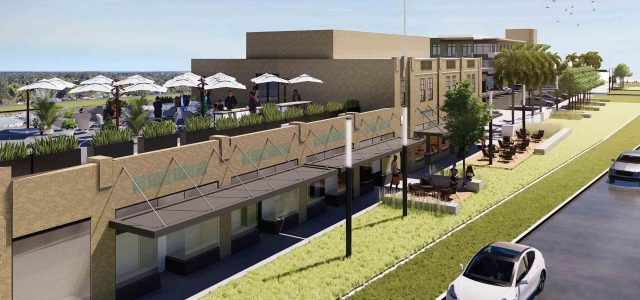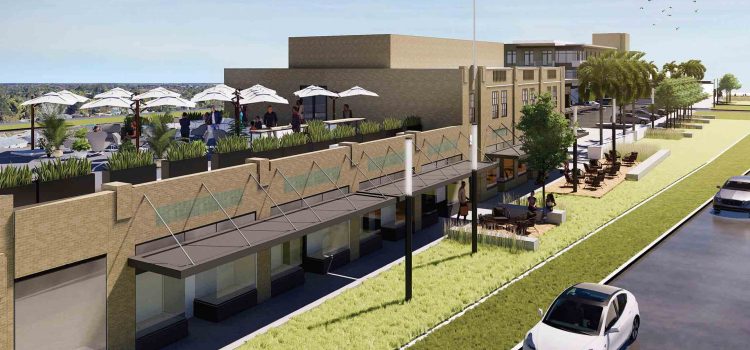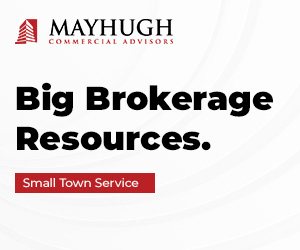


Few buildings in Southwest Florida can claim as much history as McCollum Hall in downtown Fort Myers.
Built in 1938 by Clifford McCollum Sr., the building in the Dunbar neighborhood was home to touring jazz giants such as Duke Ellington, Count Basie, Louie Armstrong and B.B.King. It was a social venue for Black servicemen during World War II and an entertainment venue for all races during segregation, bringing people together like no other place.
Now, two Florida real estate investors and developers have teamed up to breathe new life into the site as a gathering place.Just like in 1938 when McCollum decided the community needed a commercial and recreational center, Leonard Burke of Cornerstone Strategic Partners and Miles Alexander III of Alexander Goshen formed Goshen + Cornerstone LLC to redevelop the historic structure into a food hall with apartments next door.
The project is named THIRTY8 Collective @ McCollum Hall, a reference to the building’s 1938 construction and its function as a community gathering place.
“We love historic properties,” says Burke, who is based in the Tampa area and grew up in Miami.“ As we started looking at different markets in Florida, Fort Myers continued to appear on our radar.”
Burke and Alexander bring deep experience in construction and development to the project. Burke is the managing partner of Cornerstone Strategic Partners, which specializes in revitalizing urban neighborhoods. Prior to forming Cornerstone Strategic Partners, he served as the director of asset management for Beneficial Communities and Tampa Housing Authority, overseeing a portfolio of more than 4,500 residential units consisting of market-rate and affordable housing.
Alexander has led Alexander Goshen since 2014, a privately held and vertically integrated real estate and investment company with $300 million in assets and offices in Atlanta and Fort Lauderdale. The company specializes in large-scale acquisitions, developments and redevelopments, with a focus on stressed assets, value-added projects and multifamily and mixed-use properties with a portfolio of more than 2,000 multifamily units, senior living and hotel acquisitions.
Goshen + Cornerstone secured vacant parcels adjacent to McCollum Hall where the team plans to build 26 apartments, including 3,000 square feet of amenities. “We’ll be developing the entire block,” says Alexander, who notes that some of the apartments will be available at workforce-housing rates.
Inside THIRTY8 Collective @ McCollum Hall will be a food hall managed by Politan Group, a New Orleans-based operator who will bring a variety of vendors in a communal space. Such food halls have exploded in popularity in other cities across the state.
“Why not Fort Myers? There really aren’t a lot of quality food options. It just doesn’t exist in that area,” says Burke. “People can socialize and meet and have a good time in a safe, clean, aesthetically pleasing environment.”
The developers are particularly sensitive to the renovation work they’ll have to do because the building is on the National Register of Historic Places.
“It creates more challenges, but it also brings a level of awareness and flare to the project. That’s a big deal,” says Burke.
Goshen + Cornerstone is currently in negotiations for financing the $14 million project in addition to tax-increment financing from the city and credits reserved for historic buildings.
“We’re going through site plan review and approval now,” says Burke. “We’ll likely start moving dirt in the first quarter of 2024.”
Once construction begins, it will likely take 12 to 16 months to complete.
COMMUNITY ENGAGEMENT
A key component to successfully completing THIRTY8 Collective @ McCollum Hall is community engagement, Burke and Alexander say.
They say it helps that they hail from similar urban neighborhoods in Florida and Georgia. “One of the things that was evident was not a lot of developers looked like us,” says Burke. “Those areas are where I know I feel comfortable. Those areas reflect where I grew up.”
The developers say they’re sensitive to the needs and desires of the Dunbar community. To help them gather community input, they engaged Kellen Nixon of Nixon & Co., a consulting group based in Charlotte, N.C. and St. Petersburg. “
[Nixon is] our secret weapon and that’s why we feel so confident in what we do,” says Burke. “We go in and we listen. We’re not ramming something down a community’s throat.”
Nixon was raised in a similar community as Dunbar – Oakland, a prominent African American community in Haines City.
“We listen with the big ‘L.’ A little ‘l’ is listening to what people are saying, and I heard you and here’s how it ranks in my priorities. But a big ‘L’ is to listen without bias or priorities.”
So far, the team has conducted eight listening sessions reaching more than 200 residents in person and via social media using Facebook Live.
Listening well establishes trust, especially in light of the fact that two previous developers failed to finish the project, Nixon says. At first, residents asked: “Are you guys going to finish the project? We’ve seen developers come and go. Are you going to take the money and run?”
Once trust was established, residents told Kellen what they needed: housing, jobs and healthy food options. And that’s exactly what Goshen + Cornerstone intends to deliver with THIRTY8 Collective at McCollum Hall.
“We’re not just here to take something vertical with bricks and sticks,” Nixon says.
What’s more, the developers have pledged 25% participation in the construction to minority businesses and Nixon will ensure that they remain engaged throughout the life of the project.
“A project may start that way, but at the culture of the site, you’ll see minority business enterprises start to fall off because they don’t get the support. We’ll be developing that culture on the construction site,” Nixon says.
Community support for THIRTY8 Collective at McCollum Hall remains strong.
“They have been having all kinds of community chats, asking them what they’d like to see,” says Teresa Watkins Brown, the city councilwoman whose ward includes the building. “Previous developers didn’t take it to the level that Goshen has, digging in and getting into the community, really asking them what they want to see there. They’re actually working with the community.”
URBAN RENAISSANCE
Despite the fact that McCollum Hall stood empty for years, city leaders have devoted resources to keep the memories alive. The City of Fort Myers purchased the property in 2008 through the Fort Myers Community Redevelopment Agency (CRA) with hopes that it would someday experience a renaissance.
“McCollum Hall has been a project that we’ve been trying to get done for a long time,” says Watkins Brown. “We feel as a city that once this project is completed, we’ll be able to entice more economic development to Martin Luther King Jr. Boulevard.”
The building has special meaning to many lifelong residents, including Watkins Brown. “I was very young when Count Basie came through,” she says. “One of the things I do remember is I had older brothers who worked at Styleland Men’s Store. The marquis of that store is still on the hall.”
The story of McCollum Hall is a familiar one to many Florida cities as commerce shifted out of downtowns and into the suburbs during the 1980s.McCollum Hall is the kind of Art Deco building that might have been torn down and replaced by a more modern structure if it hadn’t been such an iconic gathering place.
While Southwest Florida has experienced significant economic growth in recent years, the Dunbar neighborhood along Martin Luther King, Jr. Boulevard east of downtown has been largely bypassed in favor of development on raw land outside the city.
But as commutes become longer and urban living regains appeal, redevelopment experts such as Goshen + Cornerstone are scouting opportunities in the urban core near commercial centers. Indeed, McCollum Hall is located right on the edge of the downtown business district that’s home to government, finance and professional services firms that have expanded there in recent years.
Urban living, in fact, is cool again. Restaurants, condos, apartments, hotels and shops have popped up in Fort Myers’ rebranded River District as the city invested millions of dollars over the last decade to rebuild brick streets, install modern utilities and design welcoming public spaces to attract residents and businesses downtown.
“But we need to move beyond downtown,” says Michele Hylton-Terry, executive director of the Fort Myers CRA, which selected and signed a 99- year lease with Goshen + Cornerstone for the McCollum Hall project. Hylton- Terry says investments such as the renovation of McCollum Hall will radiate through adjacent neighborhoods as people search for nearby places to live and play. She says it’s a short walk from her office downtown to McCollum Hall, for example.
A WINNING FORMULA
It takes creativity from both the private and public sectors to renovate a historic building in the urban core. That’s because renovating an existing structure is much more challenging than building a new one on raw land.
McCollum Hall piqued their interest because the City of Fort Myers took the initiative in 2008 when it purchased McCollum Hall as the previous owners didn’t have the financial resources to renovate it, amassing about $400,000 in code-violation liens. That meant replacing the roof, gutting the inside and ridding the site of any contamination. The city also had the liens waived.
“We inherited an ideal scenario; the CRA kept the building sound,” says Burke. What’s more, there was no flooding and the building remained intact after Hurricane Ian last year, a testament to the solid construction and prime location.
City officials are enthusiastic about the Goshen + Cornerstone team.
“They’re such professionals, I love the way they think through all the stages of what they’re doing,” says Hylton-Terry. “I’m very excited to see what they produce.”
More broadly, city officials hope McCollum Hall will be the spark that boosts the surrounding community.
“It was always envisioned that this would be the catalyst to jumpstart redevelopment along MLK. We see the redevelopment happening,” says Hylton-Terry.
Already, Burke and Alexander are scouting more sites nearby.
“There’s definitely a lot of opportunities,” Alexander says. “Nothing public yet.”








